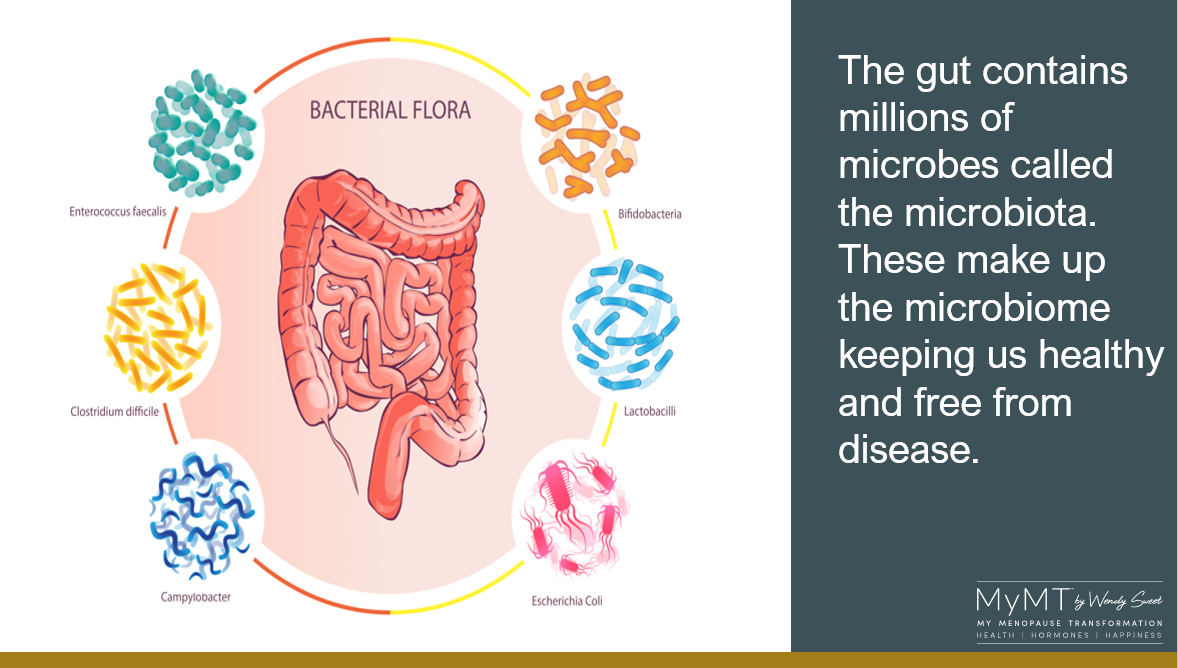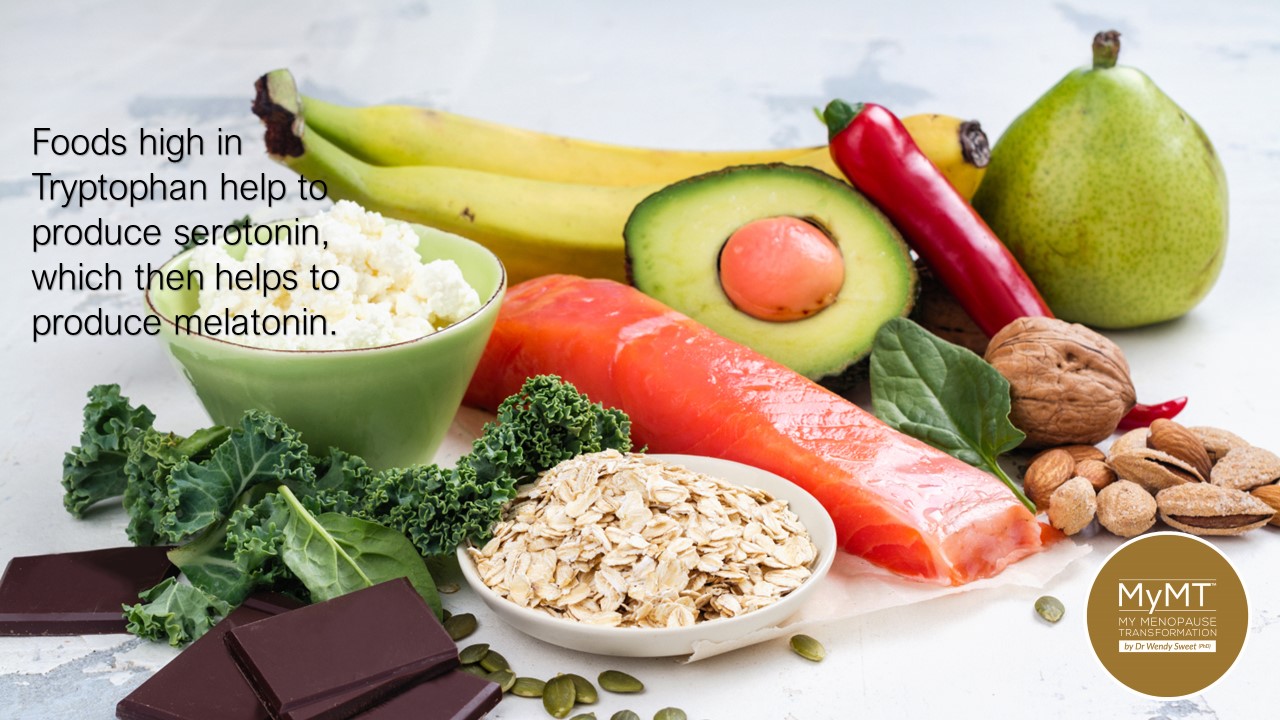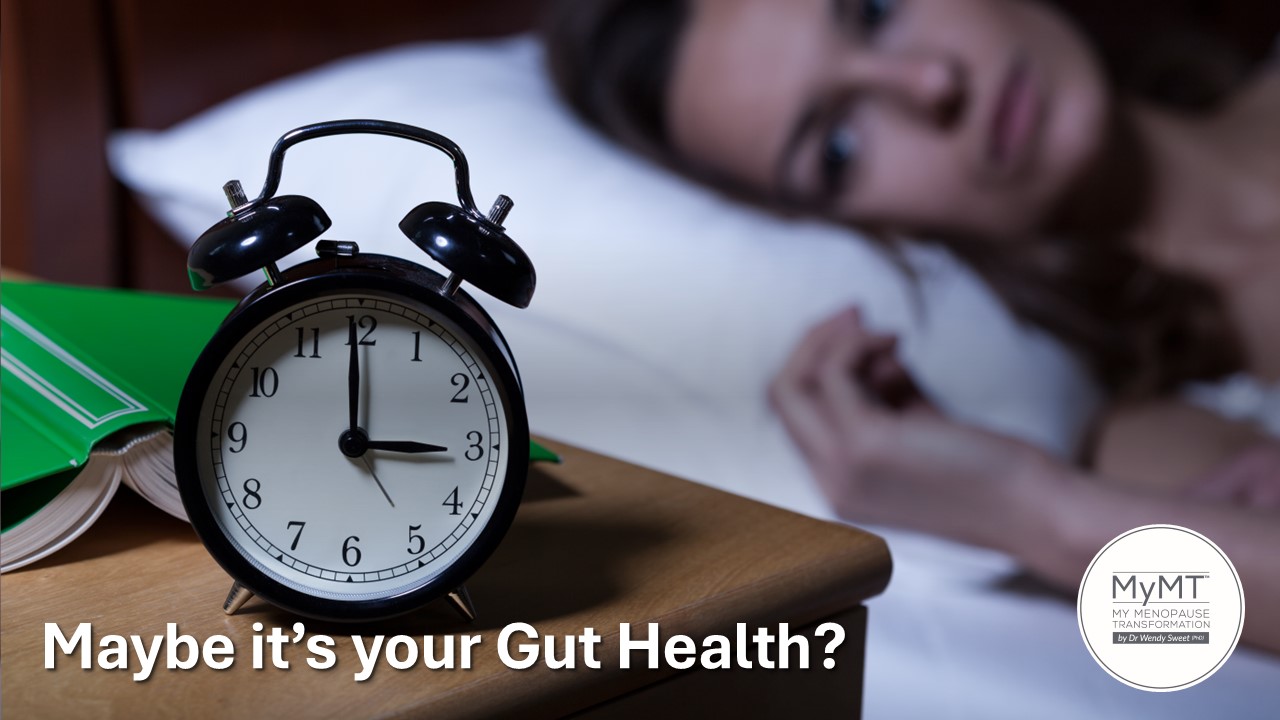There are three questions that are typically asked of subjects who undergo sleep studies:
- During the last month, have you had problems falling asleep?
- During the last month, did you ever wake up too early, not being able to fall asleep again?
- During the last year, have you been troubled by insomnia to such a degree that it influenced your work ability?
Obviously, there are others, but I wonder how you have answered these. If your answer was yes to any of them and you have arrived in your menopause transition or you are in post-menopause, I’m not surprised.
Insomnia is a hallmark symptom of menopause for millions of women. But what many of you may not know, is that your insomnia may be affected by your gut health and vice versa.
The brain-gut-microbiome axis is a bi-directional axis in which the gut and the brain communicate constantly. And according to new research (Neroni et al, 2021), this communication is dependent on three factors:
(a) the correct functioning of the vagal system (the nerve network that runs between the brain, heart and gut).
(b) the correct functioning of the neuroimmune system (the biochemical and electrical processes that connect the nervous and immune systems).
(c) the correct functioning of the circulatory system.
However, all of these interactions are reliant on one thing – a healthy gut microbiome.
If the intestinal microbiota aren’t healthy or if women have IBS from a condition called Leaky Gut Syndrome, then this bi-directional relationship is compromised. And it becomes compromised during menopause, when we can’t sleep.
It’s a catch-22 isn’t it? Because the intestines are on a 24 hr circadian rhythm, they rely on a good night’s sleep to remain healthy. But if our gut health is out of balance, then this also affects sleep.
The reason for this, which I’ve mentioned in past articles, is that the gut microbiota contributes to the production of one of our brain hormones, called serotonin. It does this through the ‘tryptophan-pathway’.
Tryptophan is a protein and it is absorbed in the small intestine. But then it travels up to the brain to help to make serotonin which then helps to produce our sleep hormone melatonin. It’s been estimated that 90% of human serotonin is produced by intestinal bacteria that possess the tryptophan gene. (Neroni et al, 2021).
So, if women have leaky gut syndrome and they don’t absorb enough tryptophan or don’t have enough tryptophan-containing bacteria, then this affects sleep quality and duration. It also affects menopause depression.

I am never surprised when women tell me that their gut health isn’t so great as they arrive in mid-life. Menopause was the first time in my life that I began to feel bloated and felt like I had developed Irritable Bowel Syndrome (IBS). A good number of women on my coaching programmes tell me this as well.
Many of us end up on numerous supplements, which may or may not work (many are too high in added sugars), or we add even more supplements to our ‘go-to’ problem-solving list.
As part of our menopause symptom solutions, turning around our gut health is important. I spent hours trying to understand what to do, especially when we are inundated with all sorts of products in the supermarket or pharmacy that purport to solve our gut health issues.
If this sounds like you, then here is some of what you need to focus on after getting your gut checked by your Doctor of course. It may be Chrohn’s Disease or Diverticulitis, or any of the myriad of other bowel problems, but first and foremost, get a good diagnosis.
Because our gut has it’s own circadian rhythm and works on a 24 hour work/ rest cycle, then sleep is important.
When our sleep gets out of balance, then so too does our gut. The two are related. Tryptophan is the starting molecule for melatonin production in all cell species (Zhao, Yu et al, 2019). This is why some dietary protein with higher levels of tryptophan is helpful in your diet.

The other thing you can do, is to learn the difference between PRE-Biotics and PRO-Biotics. Both work in different ways to keep our gut healthy. I go into more depth in this in my programmes and is the reason I have a Gut Health module for all MyMT™ women!
Essentially, we have 3 areas for digestion and absorption – our stomach, our small intestine and our large intestine. So, some of you may have problems at any part of the gut-colon tract. This is why gut-health researchers focus on both pre-biotics and pro-biotics.
It’s also why I suggest that Pre-biotics are more important to sort out first than pro-biotics in mid-life. Pre-biotics come from specialised plant fibre that beneficially nourishes the good bacteria already in the LARGE bowel or colon.
While pro-biotics introduce good bacteria into the gut, pre-biotics act as a fertilizer for the good bacteria that’s already there. They help your good bacteria grow, improving the good-to-bad bacteria ratio. This ratio has been shown to have a direct correlation to your health and overall wellbeing, from your stomach to your brain.
Plant fibres help to promote the growth of many of the good bacteria in the gut and to help alleviate constipation. They contain amylose which also helps to reduce insulin. They are therefore called RESISTANT STARCHES.
They don’t get digested in the stomach and small intestine, so they travel further down your gut into your large bowel. They are critical to your on-going health.
In fact, they are really important because consuming resistant starches as pre-biotics on a daily basis decreases anxiety, depression, and stress and enhances lower levels of our stress hormone, cortisol. As a summary, the best plant fibres for pre-biotic health are:
– skin of apples
– bananas
– onions and garlic
– jerusalem artichoke
– cooked and cooled kumara
– cooked and cooled brown rice
– cabbage (cooked slightly for better digestion)
– beans

Fermented pro-biotic foods help to reduce inflammation and prevent disease and infection by enhancing immune response in the intestine. Cheese comes into this category too – yes, a saturated fat, but some saturated fats are also important in our gut health.
The Human Genome Project [HGP] in 2002 was the largest study of gut health and indicated that we all have different gut bacteria levels based on how we have lived our lives, so you must figure out what you need to do for you, as far as the amount and type of different pre-biotics and pro-biotics you can tolerate – this includes cheese!
In the research from the HGP studies, animals and humans subjected to a high-fat, high-sugar Western diet demonstrated rapid (negative) changes in intestinal microbial community structure, with increased numbers of harmful bacteria. But within a week, of eating fermented foods and removing sugar and processed foods from the diet, the healthy gut microbial levels were partially restored.
Eat your Cabbage!
World reknowned Nutrition researcher and Doctor, Professor Jim Mann from Otago University in New Zealand, states that the bio-availability of nutrients from garlic and cabbage also have beneficial healing effects on bowel health. Cabbage is both a pre-biotic when un-cooked and a pro-biotic when fermented with salt and water, i.e. when made into sauerkraut.
To make sauerkraut, green cabbage is finely chopped and combined with sea salt and water (also known as a brine) and allowed to sit at room temperature for several days.
Cabbage contains lacto-bacillus (a strain of beneficial bacteria) on its surface, and when combined with salt water, these bacteria break down the natural sugars in cabbage into lactic acid. Lactic acid then ferments the cabbage, which turns it into a pro-biotic containing food. Go on, give it a try!
Our gut health is interesting. As we lose oestrogen receptors, this is the signal that we are ageing. As such there are structural and biological changes that occur in our gut and digestive system. For example, our bile production decreases which means that fat digestion is altered and our gut motility (movement) slows down with age.
Futhermore, many women are losing muscle, which changes their need for protein and fats in their diet. But the most important issue for so many of us is that our gut, liver, heart and blood vessels work to our natural, biological circadian rhythm, so if we aren’t sleeping we build up more and more inflammation in our body. This can also lead to the curious connection between our sleep and our changing gut health too.
I hope that you can join me in my private coaching community sometime when you purchase either of my 12 week transformation programmes. If you aren’t quite ready to do this yet, then you can also listen to the video below and then access the stand-alone MyMT™ Gut Health module too. Details to buy this are HERE for you.
References:
Braniste, V., Leveque, M., Buisson-Brenac, C., Bueno, L., Fioramonti, J., & Houdeau, E. (2009). Oestradiol decreases colonic permeability through oestrogen receptor beta-mediated up-regulation of occluding and junctional adhesion molecule-A in epithelial cells. The Journal of Physiology, 587(Pt 13), 3317–3328. https://doi.org/10.1113/jphysiol.2009.169300
Buford T. W. (2017). (Dis)Trust your gut: the gut microbiome in age-related inflammation, health, and disease. Microbiome, 5(1), 80. https://doi.org/10.1186/s40168-017-0296-0
Grenham S., Clarke G., Cryan J., & Dinan, T. (2011). Brain–Gut–Microbe Communication in Health and Disease. Frontiers in Physiology, 2 (94), 1-15. https://www.frontiersin.org/article/10.3389/phys.2011.00094
Lv WQ, Lin X, Shen H, Liu HM, Qiu X, Li BY, Shen WD, Ge CL, Lv FY, Shen J, Xiao HM, Deng HW. Human gut microbiome impacts skeletal muscle mass via gut microbial synthesis of the short-chain fatty acid butyrate among healthy menopausal women. J Cachexia Sarcopenia Muscle. 2021 Dec;12(6):1860-1870. doi: 10.1002/jcsm.12788.
Neroni, B., Evangelisti, M., Radocchia, G. et al. (2021). Relationship between sleep disorders and gut dysbiosis: what affects what? Sleep Medicine, 87, 1-7.
Park MG, Cho S, Oh MM. Menopausal Changes in the Microbiome-A Review Focused on the Genitourinary Microbiome. Diagnostics (Basel). 2023 Mar 21;13(6):1193. doi: 10.3390/diagnostics13061193.
Siddiqui R, Makhlouf Z, Alharbi AM, Alfahemi H, Khan NA. The Gut Microbiome and Female Health. Biology. 2022; 11(11):1683. https://doi.org/10.3390/biology11111683
Smith, R. P., Easson, C., Lyle, S. M., Kapoor, R., Donnelly, C. P., Davidson, E. J., Parikh, E., Lopez, J. V., & Tartar, J. L. (2019). Gut microbiome diversity is associated with sleep physiology in humans. PloS one, 14(10), e0222394.


